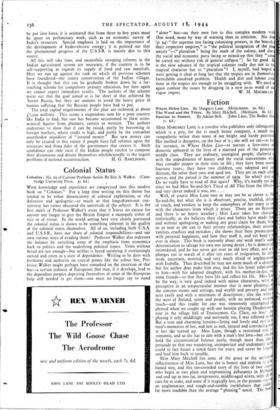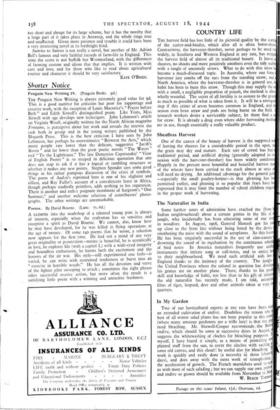Fiction
Miss MARGARET LANE is a novelist who publishes only infrequensis which is a pity, for she is much better company, a much nu sympathetic writer than many of our bright and hardy perenni Her method is deceptive, on the face of it ; she will set out—as her for instance, in Where Helen Lies—to narrate a love-story domestic upheaval in the lives of a married pair of the prosper middle class. They are ordinary, unoriginal people, cluttered with the impedimenta of luxury and the social conventions wh they consider proper to their state in life ; they have been mare fourteen years; have two children, one adopted and ag thirteen, the oter their own and aged ten. They are on each oth nerves, and the period is the summer of 1939. So what? you Do we really have to read all that again? Why, it's hardly ten d since we had Miss So-and-So's Tired of All This from the library and very clever indeed it was, too... . Well, of- course Miss Lane may or may not be as clever as AI So-and-So, but what she is is observant, precise, truthful, delis of touch, and 'resolute to keep the atmosphere of her story in with the characters• from which it arises. There are no fire= and there is no heavy weather ; Miss Lane takes her charact realistically, as she believes their class and habits have made th and without apologising or making any great claim for them, br us as near as she can to their private relationships, their anxiea vanities, cruelties and mistakes • she shows their busy preoccupa with personal happiness, and how they muff it, and yet keep it ever in chase. This book is narrowly about one weak man's su determination to salvage his own one strong desire ; he is domesti intimidated, and he has never got over an old love affair, and as plunges out in search of it after ten years of resignation, he still weak, uncertain, worried, and very much afraid of unpleasan with Isabella. Thus described he may not seem much of a cliara but his author does make him true, and fits his lesser relationshi to him—with his adopted daughter, with his mother-in-law, some friends—so that they have life and reflect his life. Miss by the way, is very good indeed with minor characters, witty perceptive in an unspectacular manner that is most pleasing ; she conveys rooms and settings, and wealth and poverty and ness easily and with a minimum of description ; also she writes the west of Ireland, scene and people, with an unforced, evoca touch—and this reader for one was immensely entertained pleased when-we caught up with our heroine playing Desdemona tour in the village hall of Ennistymon, Co. Clare, no less! playing it only middlingly and nervously too, I was relieved to But a true and charming heroine—living and lovely -and real in man's memories of her, and-just as reil, natural and convincing at last sbe turned up. Miss Lane though a restrained one, 0 romantic, and so she has to side-with a man's lost love—but she hold the circumstantial balance justly, though more than able persuade us that one wandering, unimportant and undramatic ac could in fact haunt a timid heart for years, and never be forgo and lead him back to trouble.
Miss Mary Mitchell' has none of the grace or the undert reflectiveness of Miss Lane, but she is honest and realistic in 3 footed way, and this too-crowded story of the lives of two sisl who begin as two plain and unpromising débutantes in Mel and end up as two fat, inexpressive, middle-aged wives, with all care for at stake, and some of it tragically lost, in the present war an unglamorous and rough-and-tunible truthfulness that M. ,.ake5 far more readable than the average " pleasing " novel. The bto-
too short and abrupt for its large scheme, but it has the novelty that a large part of it takes place in Antwerp, and the whole rings true and unaffected. Given more patience and trouble it could have been a very interesting novel in its forthright kind.
Sunrise to Sunset is not really a novel, but another of Mr. Adrian Bell's famous and very faithful records of farm-life in England. This time the scene is not Suffolk but Westmorland, with the differences of farming custom and idiom that that implies. It is written with care and love, and for those who like to read about agricultural routine and character it should be very satisfactory.
KATE O'BRIEN.























 Previous page
Previous page